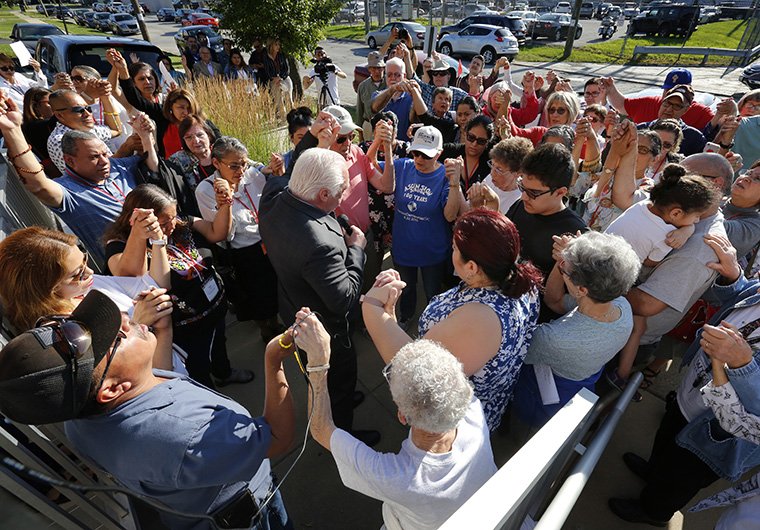OUR STORY

In May 2005, the United States Conference of Catholic Bishops (USCCB), gathered in Chicago with Cardinal Francis George as Vice-President, decided to put this Pastoral Letter into effect, launching the Catholic Campaign for Immigration Reform/Justice for Immigrants. This marked the first time in the history of the United States Conference of Catholic Bishops that a prophetic commitment was made to work for Comprehensive Immigration Reform for the benefit of immigrants in the country, in line with the document "Together on the Journey of Hope: We Are No Longer Strangers." This Catholic Campaign had and still has three very important objectives.
A. To educate Catholics about the benefits of immigrants and immigration. This means raising awareness and calling for conversion.
B. To advocate for Immigration Reform based on the principles of the Pastoral Letter: "Together on the Journey of Hope: We Are No Longer Strangers."
C. To serve immigrants in the process of legalization once the Immigration Reform law was approved. This objective is very important because it emphasizes the call to serve the immigrant people.
During this meeting, the Bishops of the United States committed to developing and joining efforts in their own dioceses for the benefit of immigrants as a supportive action for this Campaign.
Beginnings of Pastoral Migratoria
In June 2007, the immigrant community of the Archdiocese of Chicago (as in the rest of the country) and all those who had been working for years to achieve Comprehensive Immigration Reform felt great sadness and helplessness when they learned that the bill had not been approved by the Senate. It was in this atmosphere that lay leaders from different parishes who had been working for Immigration Reform were invited to a meeting to reflect on what had happened. The Catholic immigrant community felt as if God had "abandoned" them as if Job's expressions were once again being heard: "My sobs are my food; my drink, the tears of sorrow. All that I feared, what I most dreaded, has come upon me. I have no peace, no rest; trouble comes upon me."
The immigrant community went through a kind of 'depression'; there was much frustration and a sense of loneliness and abandonment as if God had moved away.
After emerging from this stage, two fundamental questions arose among immigrants. The first: What is God telling us in this situation? What is His message? The second: What can we do for each other? Is there anything we can do in our parishes, or are we waiting for someone to do something for us?
Shortly after this meeting, Father Carlos Quebedeaux, CMF, the pastor of Our Lady of Guadalupe, arrived at the Office with the same questions about what could be done with the community. There was concern that people were fearful due to the raids that were starting to occur in various parts of the country, as happened in Postville, Iowa. In that place, on May 12, 2008, 290 Guatemalans, 93 Mexicans, 3 Israelis, and 4 Ukrainians were detained at their workplace in the meatpacking factory. They were all later deported.
Pastoral Migratoria & Methodology
Definition of Pastoral Migratoria:
Pastoral Migratoria (PM), is a vital initiative within the Archdiocese of Chicago that focuses on serving and accompanying immigrant communities. It was born out of the need to support and empower immigrants, especially during times of uncertainty and challenges in the immigration landscape.
Description:
Pastoral Migratoria is a ministry grounded in the Catholic faith and committed to addressing the specific needs and concerns of immigrant communities. Its core principles include service, accompaniment, justice, and leadership. The ministry's primary goal is to provide support and assistance to immigrants, ensuring they have access to essential services, legal resources, and pastoral care.
In essence, Pastoral Migratoria serves as a bridge between the Catholic Church and immigrant communities, providing them with spiritual support, resources, and empowerment. It operates under the belief that by accompanying immigrants on their journey and advocating for their rights, they can contribute to the betterment of society as a whole. The ministry seeks to create a space where the values of respect, dignity, compassion, justice, and peace are lived realities for immigrant communities.


